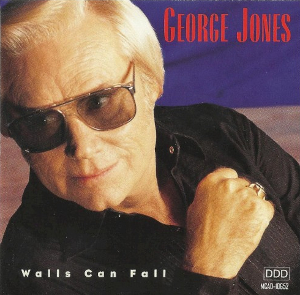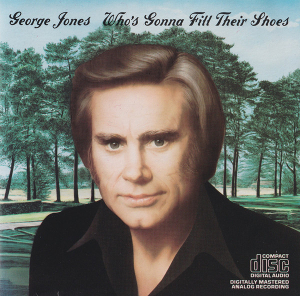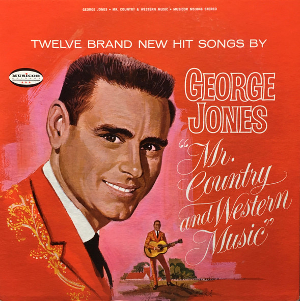
One Woman Man is an album by American country music artist George Jones, released on February 28, 1989, on Epic Records.

Walls Can Fall is an album by American country music artist George Jones. This album was released in 1992 on the MCA Nashville Records. It peaked at number 24 on the Billboard Country Albums chart and number 77 on The Billboard 200 chart. Walls Can Fall went Gold in 1994.

Who's Gonna Fill Their Shoes is the 45th studio album by American country music artist George Jones, released in 1985 on the Epic Records label.

Jones Country is an album by American country music artist George Jones released in 1983 on the Epic Records label.

A Picture of Me (Without You) is an album by American country music singer George Jones. It was released in 1972 on the Epic Records label. The release was Jones' 47th studio album, his second solo LP for Epic Records, and is also one of four albums released by the singer during the year 1972 (two as a solo artist, and two duet albums with his wife Tammy Wynette) as producer Billy Sherrill wasted no time in flooding the market with new recordings by "the Possum". Jones's first album, George Jones (We Can Make It), made it to number 10 on the country albums charts but his second effort did better, rising to number three and featuring songs with a wider range of themes than those found on his Epic debut, which celebrated the happiness of new love. The album's title track was the only single release from it, peaking at #5 on the Billboard country singles charts.

Walk Through This World with Me is an album by American country music artist George Jones released in 1967 on the Musicor Records label.

Mr. Country & Western Music is an album by American country music artist George Jones released in 1965 on the Musicor Records label.

What's in Our Heart is an album by American country music artists George Jones and Melba Montgomery released in 1963 on United Artists Records.

I Wish Tonight Would Never End is an album by American country music artist George Jones. It was released in 1963 on the United Artists record label.

"Why Baby Why" is a country music song co-written and originally recorded by George Jones. Released in late 1955 on Starday Records and produced by Starday co-founder and Jones' manager Pappy Daily, it peaked at 4 on the Billboard country charts that year. It was Jones' first chart single, following several unsuccessful singles released during the prior year on Starday. "Why Baby Why", has gone on to become a country standard, having been covered by many artists.
"Walk Through This World with Me" is a song written by Sandy Seamons and Kaye Savage and recorded by American country music artist George Jones. It was released in January 1967 as the title track of his twenty-fourth album. The single was George Jones' fifty-seventh release on the country chart and his fourth number one. "Walk Through This World With Me" stayed at number one for two weeks and spent a total of nineteen weeks on the country chart.
"The Window Up Above" is a song written and originally recorded by American country music artist George Jones. The version recorded by Jones peaked at number #2 on the country charts and spent a total of 34 weeks on the chart. It became a #1 smash for Mickey Gilley in 1975.
"Same Ole Me" is a song written by Paul Overstreet, and recorded by American country music artist George Jones with The Oak Ridge Boys. It was released in January 1982 as the second single and partial title track from Jones' album Still the Same Ole Me. The song reached number 5 on the Billboard Hot Country Singles chart and number 1 on the RPM Country Tracks chart in Canada.
"Loving You Could Never Be Better" is a song written by Earl Montgomery, Charlene Montgomery and Betty Tate, and recorded by American country music artist George Jones. It was released in April 1972 as the second single from his album George Jones . The song peaked at number 2 on the Billboard Hot Country Singles chart. It also reached number 1 on the RPM Country Tracks chart in Canada. The song was a good example of how producer Billy Sherrill had updated the sound of Jones' records, incorporating a laid back, R&B bass line. By drawing from such unlikely and disparate musical influences as Johann Strauss and "wall of sound" rock producer Phil Spector, he gradually began embroidering his own subtle permutations on the rather predictable fabric of country record production. "I just decided I'd do it my way, and screw 'em if they didn't like it," Jones biographer Bob Allen quotes Sherrill. "Back then, the musicians had their own repertoire of stock Nashville licks and chord progressions that would work on any song. But I often wanted something different, and I'd make 'em play it."
"I Don't Need Your Rockin' Chair" is a song written by Billy Yates, Frank Dycus and Kerry Kurt Phillips, and recorded by George Jones. It was the first single from his 1992 album Walls Can Fall.
"Let's Invite Them Over" is a song written by Onie Wheeler, which was recorded as a duet by American country artists George Jones and Melba Montgomery. The song was released as the pair's second single in 1963.
"You Gotta Be My Baby" is a song written and recorded by George Jones. It was his second Top 10 hit on Starday Records, peaking at #7 on the country singles chart. That same year, he sang "You Gotta Be My baby" at his first appearance on The Grand Ole Opry. According to Bob Allen's book George Jones: The Life and Times of a Honky Tonk Legend, Jones nearly walked off the Opry show when one of the WSM officials told him he could not take his guitar with him onstage but relented after Opry regular George Morgan handed him a guitar owned by Little Jimmy Dickens and promised he would take responsibility. In the video biography Same Ole Me, George recalled, "I was just so nervous. This was the biggest thing that could ever happen to anybody in the world and I was just shakin'. I mean just truly shakin' all over."
"Tell Me My Lying Eyes Are Wrong" is a song by George Jones. A "cheatin' song" written by Dallas Frazier and Sanger D. Shafer, it was released by Jones as a single on Musicor Records and peaked at No. 13 on the Billboard country music chart in 1970. Jones was becoming disenchanted with the production of his records, which were being issued at a furious pace. As Bob Allen points out in his book George Jones: The Life and Times of a Honky Tonk Legend, "During his time with Musicor, "George recorded more than over 280 songs - most of which were done in rushed, sloppily produced sessions - and help to establish for himself a somewhat unwelcome reputation as one of country music's most overrecorded artists."
"I'll Follow You (Up to Our Cloud)" is a song by George Jones. It was written by David Turner.
"Rock It" is a rockabilly single by country music singer George Jones. Not wanting to use his real name and jeopardize his reputation as a country artist, Starday Records released it under the pseudonym "Thumper Jones."









